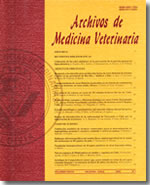Detection and characterization of infectious bronchitis virus in Chile by RT-PCR and sequence analysis
Main Article Content
Abstract
A reverse transcriptase-polymerase chain reaction (RT-PCR) assay, coupled with sequencing, was used to detect and genetically characterize different infectious bronchitis virus (IBV) isolates in Chile. The RT-PCR procedure included the use of the primers NT1 and NT2 that were located close to the N-terminus of the S1 gene and bracketed the hypervariable region, and the amplified sequences were aligned and analyzed with DNAman software, and compared with sequences from GenBank. The level of detection of the RTPCR assay was equivalent to virus isolation in eggs when testing tissues directly, but the assay was more sensitive when used to detect virus stored in allantoic fluid. The amplimers from all historical Chilean isolates were identical in size (193 bp) and exhibited 71-96% similarity on sequence analysis. These isolates showed between 68-97% similarity to strains from North America, Europe, Asia, New Zealand and Australia.

